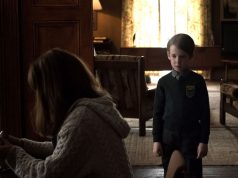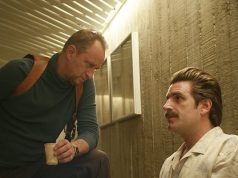Somewhere in “Ladies in Lavender” is a very sweet story about a sad old lady who has never known love. But that story is lost in the film’s — well, I don’t know where it’s lost. Sometimes you think it’s going to be about a young man finding himself, but then no, that was just a passing thing. So why keep neglecting the real story? The mismanagement seems almost willful.
It is set in a tiny English seaside village in the 1930s, where two old sisters live together. Janet (Maggie Smith), we eventually learn, had a love who died in the first World War. But Ursula (Judi Dench) has never even loved, let alone loved and lost. Both are prim, proper ladies, as we expect from British old women in the 1930s, and indeed as we expect from Maggie Smith and Judi Dench. Ursula is slightly dottier, though, just a little more youthful. It is she who wakes up Janet to show her that the sun has finally come out after a long storm, the way a child would do.
It is also she who spots a body lying on the beach, visible from their cottage. They hurry down and discover it’s a young man, apparently shipwrecked and washed ashore, and still alive. They take him home and nurse him back to health. He is named Andrea (Daniel Bruhl), and he is from Poland, though Janet is able to communicate with him just a little bit in German, which he speaks fluently and which she has a book about.
The ladies gradually learn more details about their grateful patient. Turns out he plays the violin, for one thing, at almost a virtuoso level. His playing draws the attention of Olga (Natscha McElhone), a beautiful young woman on holiday in a nearby cottage. The ladies are wary of her, though for what reason I couldn’t say. Ursula appears to be falling in love with the young man, but Janet is far more circumspect and practical. What reason does she have to be suspicious of a perfectly harmless female suitor?
Ah, yes. Ursula. Her feelings for Andrea start out grandmotherly, but quickly become something else altogether. She does not voice it, but we see it in her face, in the way she regards him. She knows it’s folly to be in love with someone 45 years her junior, of course, and that is part of the sadness of the film (which was written and directed by British actor Charles Dance, adapted from William J. Locke’s short story). As much as we want her to be happy, we also know an Ursula-Andrea partnership is not in the cards.
If there is a reason to see the film, it is for Dench and Smith, two marvelous old British dames who have been friends for decades yet who have appeared in only two previous movies together. (“A Room with a View” and “Tea with Mussolini,” for you trivia buffs.) You can see their theatrical training — their real, actual ACTING training — in the way they approach their characters, giving them small flourishes and nuances beyond what less-seasoned actresses would think to give. They are the sort of performers that students of fine acting are pleased to watch in anything, even if it’s sweet-but-unsatisfying, unremarkable stuff like “Ladies in Lavender.”
B- (1 hr., 43 min.; )





